Innovative Implements are the Pride of Tsubame-Sanjo
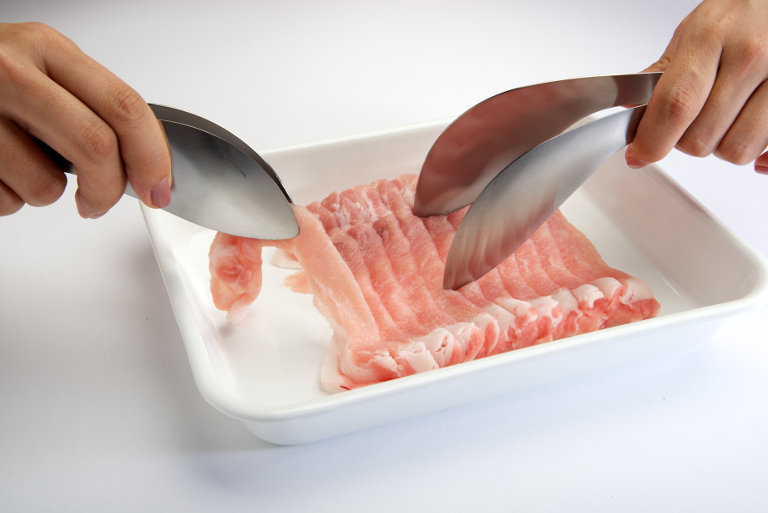
The towns of Tsubame and Sanjo, in Niigata prefecture on the Sea of Japan, are among the foremost producers of metalwork in Japan. Tsubame has perfected its polishing methods, while Sanjo has wide-ranging expertise in forging. The two towns have a solid record of making products ranked among the best in the world. For example, the sleek, polished surface of the iconic mini music players of a decade or so ago originated at the hands of the craftspeople of Tsubame.
Production of metal goods in Tsubame and Sanjo began about 400 years ago, in the Edo period. In the years after World War II, metalworking was a mainstay export industry for Japan. Today, as the focus has shifted from mass production, Tsubame and Sanjo specialize in finely crafted, high-quality kitchen implements.
One interesting development in this field is Aux, a Sanjo-based company that’s in the business of producing ideas; it has no manufacturing plant or craftsmen of its own. The ideas generated by Aux are translated into products by local factories and workers. One such product is the Yubisaki [fingertip] Tongs, one of the company’s best sellers, which allow users to prepare food without dirtying their fingers. Developed by an all-woman team, the tongs fly off the shelves at the rate of 20,000 units a month, even though they cost more than standard tongs. Production team leader Noriko Ishiwata uses two pairs of the tongs – one in each hand – when she cooks. She says, "I wanted something that would act like a second set of fingers, so I could prep food without getting my fingers dirty. These tongs let me handle any kitchen task, from separating thin strips of raw meat to holding down piping-hot deep-fried cutlets for cutting into bite-size pieces. In developing the product, my team paid special attention to ensuring that the tongs spring smoothly, and they’re also designed to fit women’s hands."
Unlike conventional tongs, which are made of two connected moving parts, the Yubisaki Tongs are made from a single piece of stainless steel designed with beautifully fluid lines; they fit perfectly in the hand. The tongs are easy to use, opening and closing in response to slight variations in pressure, and they really do feel like a second set of fingers. The tongs can reliably grip even paper-thin slices, but what’s most attractive about them is how natural they feel in the hand. They’re called Yubisaki Tongs because they replicate the action of the fingertips.
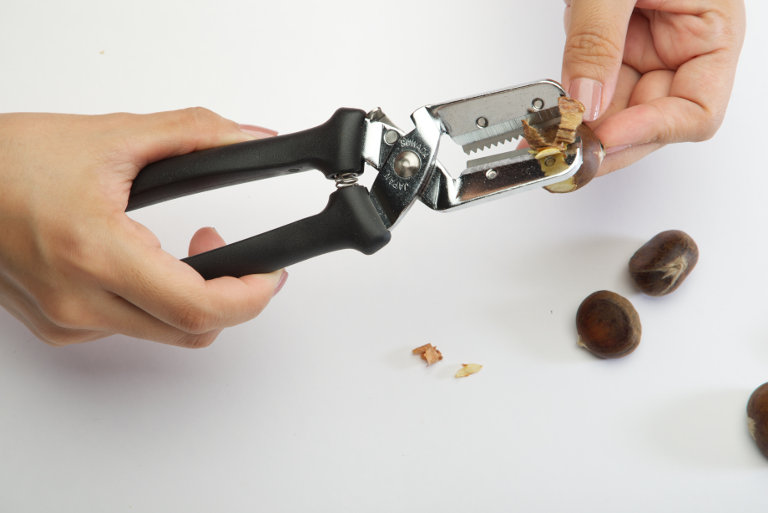
Designed by Aux, the tongs are manufactured by Tanabe Kanagu, a well-known maker of high-end tongs, which also holds a patent for putting the springiness into the stainless steel. Tanabe’s tongs are guaranteed to retain their spring for the life of the product. Tanabe employee Kazuhito Itaya boasts, "Our tongs were tested 100,000 times before we put them on the market. Even after such intensive testing, they didn’t lose any of their spring. It’s just too bad we didn’t have a chance to test them even more extensively. "Aux also expresses confidence in Tanabe’s manufacturing prowess: "We want to take full advantage of local capabilities, so our product designs use stainless steel as much as possible."
Aux’s all-women team also developed the Mizukiri [strainer] Ladle, a dual-purpose scoop with a bowl about the size of a woman’s palm. When the ladle is angled appropriately, liquids drain out through holes cut into the upper part of the bowl, so only solids are left behind. When the tool is held vertically, it functions as a conventional ladle.
Another popular product is the Oroshi [grater] Spoon, which incorporates metal grating teeth into a large spoon. This item is useful for grating ginger or garlic, which can then be added directly to a dish by dipping the spoon into the broth and using it to stir. The basic concept of the Oroshi Spoon is so simple that it’s surprising such a product had not been made before. In the words of Takayoshi Fukasawa of Aux’s product planning department, the Oroshi Spoon "is something that everybody wanted, but no one had thought to translate into a product."
Suwada’s Chestnut Peeler: Guaranteed to Stay Sharp
Aux isn’t the only company in the Tsubame-Sanjo area that’s successfully planning and developing new products. Suwada, a forge known for its super-sharp nail scissors, has applied its forging technology to producing scissors for paring chestnuts.

Chestnuts have a tough outer shell and astringent pellicle that are difficult to peel properly; one often ends up with chestnut flesh under the fingernails. Using a knife to peel chestnuts isn’t recommended, as it’s likely to slip off the shell and cause injury. And the pellicle clings tightly to the nut, staining the fingers when it’s peeled off. The "Kurikuri-bouzu," one of Suwada’s bestselling products, solves these headaches in an instant and makes peeling chestnuts a breeze.
The scissors-like "Kurikuri-bouzu" features a set of steel blades atop resin grips. One serrated blade holds the chestnut in place, while a second, straight-edged, blade rotates around the nut like a razor to peel off the tough skin. The motion, which is not unlike using a manual can-opener, may take bit of practice, but once you get the knack, you can vary the pressure on the blades to peel the nut, pellicle and all, or just remove the outer shell.
Suwada Blacksmith Works originally specialized in the production of kuikiri, a tool for nipping the heads off traditional Japanese nails used for construction. Today, the company produces nail scissors and chestnut peelers, both of which operate by squeezing and cutting. Suwada public relations officer Natsuko Oshima says proudly, "Our craftspeople are the stars of our enterprise."
The buzz of craftsmanship permeates the company, and every member of the forty-person workforce is dedicated to the manufacture of easy-to-use, razor-sharp tools. Though Suwada has established a solid reputation, anyone visiting its production floor—visitors are welcome anytime—will witness the company’s passion for continued improvement. In a space painted a color that the employees call "smithy black," its walls lined with neat displays of past products, workers furrow their brows in concentration. This is where the skills and secrets of the trade are passed on from veteran craftsmen to their juniors, and there’s apparently a long waiting list for apprenticeships.
The blades of the "Kurikuri-bouzu" chestnut peeler, a product of sophisticated forging technology, are guaranteed for durability. They also resist being discolored by the astringent pellicle. Replacement blades are provided; they can be stored in the plastic sheath protecting the blade tips so they’re always at hand when needed. The peeler is also equipped with a safety catch.
Tomoyuki Kobayashi, Suwada’s president, has just one complaint. "Our ‘problem’ is that neither our nail scissors nor our chestnut peeler ever break, so customers don’t come back for repeat purchases." But Suwada’s success is a testament to the ingenuity and care that go into each product to guarantee long years of use, as well as to the company’s pursuit of quality and perfection – the hallmarks of kitchen implements that Japan can be proud of.


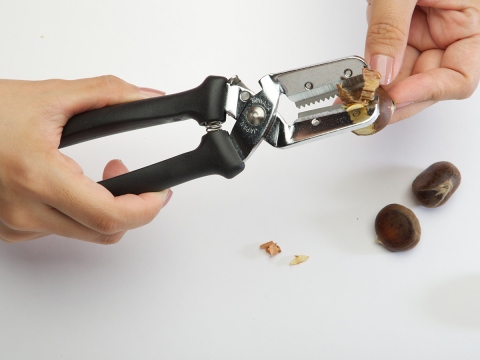
 Metal a la mode (front cover)
Metal a la mode (front cover) 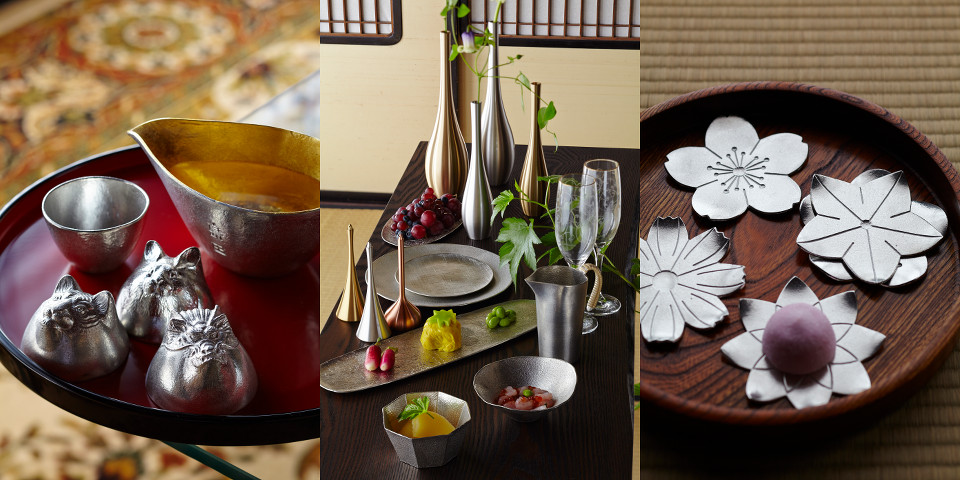 Changing Metal’s Image--Nousaku
Changing Metal’s Image--Nousaku 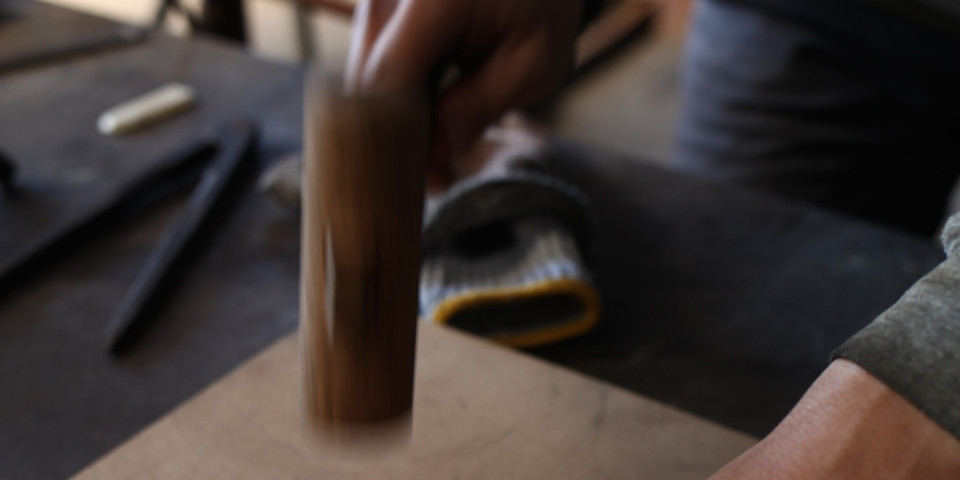 Hammered-metal artist--Jun Tanaka
Hammered-metal artist--Jun Tanaka 


